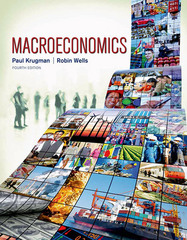Question
COVID-19 is the largest health and economic crisis of our generation. Since it first broke out in China in December 2019, it has claimed the
COVID-19 is the largest health and economic crisis of our generation. Since it first broke out in China in December 2019, it has claimed the lives of half a million people worldwide. It is also exerting significant economic toll on the world and Canada included. Canada recorded an 8% decline in GDP growth in the first quarter of 2020 and up to 3 million Canadians lost their jobs with unemployment rate hitting 13.7% in May 2020. The government of Canada has engaged in veryaggressive expansionary fiscal policyto support the economy andstimulate aggregate demand. Numerous programs such as the CERB, CEWS, CESB and many others are implemented by the government of Canada. Government spending has risen dramatically resulting in unprecedentedbudget deficitfor Canada. In the latest fiscal update issued by finance minister Bill Morneau, the government is predicting a deficit of $343 billion in the year 2020, or 10 times the budget deficit initially planned before the pandemic. For a snapshot of this update, follow the CBC link below:
In Chapter 10, Fiscal Policy, we learned about theexpansionary fiscal policyand how it is used to pull economy out of recession by increasingaggregate demand. And we also learned that expansionary fiscal policy is used much more often in the past 30 years in Canada thancontractionary fiscal policy. The use of fiscal policy is justified in the sense that theeconomy can take too long to self-correct out of a recession.However, expansionary fiscal policy has limitations, in particular thecrowding-out effectcould raise interest rates in the long run and reduce future economic growth. The highdebt to GDP ratioresulting from large budget deficit could also threaten future generations with excessive burden of debt and lower their standard of livings in the future. In fact, some down side is already showing up from this policy with Fitch, an international rating agency,reducing Canada's credit ratingfrom AAA to AA+ on June 24, 2020 in anticipation of huge deficit spending in 2020. A lower credit rating will raise the cost of borrowing for the government of Canada.
detail the fiscal response of the Government of Canada during the COVID-19 Crisis and commenting its impact on the economy in aggregate demand, interest rates, debt to GDP ratio, etc. In your opinion, how should the government achieve a delicate balance of stimulating the economy without too much of the side effects brought on by expansionary fiscal policy?
Step by Step Solution
There are 3 Steps involved in it
Step: 1

Get Instant Access to Expert-Tailored Solutions
See step-by-step solutions with expert insights and AI powered tools for academic success
Step: 2

Step: 3

Ace Your Homework with AI
Get the answers you need in no time with our AI-driven, step-by-step assistance
Get Started


